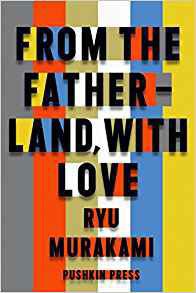

Support BOA by ordering From the Fatherland With Love through these links:
Amazon U.S.
Amazon Japan
Thanks for helping support Books on Asia!

was awarded the 59th Mainichi Publishing Culture Award and the 58th Noma Literary Prize in 2005.
From the Fatherland, with Love is set in an alternative, dystopian present in which the dollar has collapsed and Japan’s economy has fallen along with it. The North Korean government, sensing an opportunity, sends a fleet of ‘rebels’ in the first land invasion that Japan has ever faced. Japan can’t cope with the surprise onslaught of ‘Operation From the Fatherland, with Love’. But the terrorist Ishihara and his band of renegade youths – once dedicated to upsetting the Japanese government – turn their deadly attention to the North Korean threat. They will not allow Fukuoka to fall without a fight. Epic in scale, From the Fatherland, with Love is laced throughout with Murakami’s characteristically savage violence. It’s both a satisfying thriller and a completely mad, over-the-top novel like few others.
(Note: this book has two different covers, depending on the edition)
Excerpt:
A MISSED SIGN
March 3, 2011
Tokyo
SUZUKI NORIKAZU flinched at the cold air outside the exit to Kasumigaseki subway station. Feeling the chill on his neck, he
sneezed as he set off down the road. The government district was thronged with demonstrators, from right-wingers in their campaign trucks to civil-rights groups and labor unionists, all yelling through bullhorns, vying with one another to be heard. Awfully cold for March, Suzuki thought to himself. He felt like joining in the shouting.
He hadn’t been getting enough sleep lately and could feel himself coming down with a cold. He should have worn a muffler.
That morning he’d sent his thirteen-year-old daughter a bouquet of flowers complete with a free hina doll via an Internet florist. She had remained with his ex-wife after the divorce five years ago, and Suzuki had resolved to send her flowers every year on her birthday. Ever since elementary school she had grumbled about it being on March 3, coinciding with the Doll Festival held for Girls’ Day, which meant she had to make do with one celebration instead of two. Each time he sent the flowers, he was reminded that it was already March and spring had almost arrived. Over the years the connection had become fixed in his mind, and although the weather forecast that morning had warned that the temperature was ten degrees lowerthan normal for the time of year, he’d left home without a scarf.
Suzuki worked in the Cabinet Intelligence and Research Office, commonly known as CIRO. For the past few years they had been steadily cutting back on staff, suspending new recruitment, and transferring some existing personnel, so that by last April the workforce had shrunk from more than a hundred and fifty to fewer than a hundred and twenty. Taking time off work for a cold now would merely add to the flak already being directed at employees like himself who had come from the private sector. All the ministries and government offices in Kasumigaseki were being restructured, not just the Cabinet Office and the Home Affairs Ministry. Whenever he got together with colleagues, the conversation would always turn
gloomily to rumors of the retirement fund drying up within five years.
Hunching against the wind, he joined the swarm making its way toward the various government buildings. On opposite sides of the road outside the Cabinet Office, right-wingers and labor unionists were trying to outshout each other in their tirades against the government and bureaucrats. The rightists were calling for Japan to arm itself with nuclear weapons and revive the military draft, so that it could stop kowtowing to America and China and become a truly sovereign nation. The unions, meanwhile, howled that adhering to Article Nine of the Constitution was essential to maintain peace and protect jobs. Both sides, however, were united in their hatred of the present administration.
The herd of civil servants, Suzuki among them, scurried along to their various offices, trying to ignore the blaring loudspeakers. For a number of years the economy had been in sharp decline, leading to an unprecedented recession coupled with inflation. As a last resort bank accounts had been frozen to save the financial system, but this had devastated the money markets. A regulated economy was anathema to foreign investors, and they had abandoned the Japanese market in droves. Businesses had undergone ruthless downsizing in an attempt to survive, and the number of suicides among middleaged and senior citizens had almost doubled. It wasn’t only the rightists and labor unions that loathed the bureaucrats, whose jobs and monthly salaries were secure.
“Good morning,” Suzuki greeted the security guard at the entrance to the Ministry, sneezing again as he showed his pass.
“You all right, sir?” asked the elderly guard, his familiar face creasing in a concerned smile. “I always use these meself,” he added, pulling out several pocket warmers from his jacket. “With those guys around, it somehow feels a whole lot colder.” Behind him was an armored vehicle and several Self-Defense Force soldiers in combat gear. The thick steel panels of the heavy camouflaged truck really did seem to emanate a chill. Following the freeze on bank deposits, Molotov cocktails had been thrown at the Ministry of Finance, a bomb was planted in the Prime Minister’s official residence, and last summer there had been an Islamic fundamentalist-style suicide bombing outside the National Diet building. The explosion hadn’t been large enough to cause a major tragedy, but it had led to emergency legislation allowing deployment of the SDF to guard the Diet, government offices, and other key facilities such as nuclear power stations.
The Self-Defense Force was isolated in its relations with East Asia and the wider international community, and even its dealings with US forces stationed in Japan had soured. The freeze on bank accounts had been precipitated by the pensions crisis as the baby-boomer generation of civil servants began reaching retirement age. Local government bonds together with investment and loan bonds had gone into free fall, and interest rates on national bonds had shot up. Inflation and recession hit at the same time, anxiety and discontent spiraled, and resentment simmered nationwide. In order to stay in
power, last year the government had tilted toward expanding the military, provoking strong warnings and opposition from America and Europe as well as China, Russia, and South Korea. Many who had lost their life savings, and the politicians who depended on their support, were in favor of amending the Constitution to allow a military build-up and nuclear armament as a means of salvaging national pride. This faction held sway despite calls for international cooperation from financial circles and liberal politicians. The more isolated Japan became, the more people disillusioned by financial hardship were drawn to a hardline point of view.
For the past five years, the United States had been redeploying its overseas armed forces, and the number of its troops based in Japan had already been halved. The financial and trade deficits had ballooned under the War on Terror, causing the dollar to plummet and effectively ending American global hegemony. The new administration formed by the Democrats sought more collaborative ties with Europe, China, and Russia. It joined China and Russia in expressing grave concern over Japan’s nuclear armament, and hinted at revoking the Japan-US Security Treaty while also indicating its willingness to end the embargo on weapons sales to China and abandon the Japan-US joint missile defense system. It then announced a hike in the price of feed grain to Japan, which was still reeling from depleted foreign reserves due to the drop in value of the yen. This was taken to mean that America would not give any aid to Japan in the event of food or energy crises—which were in fact already happening. This sudden U-turn provoked indignation even among the most pro-American politicians and media, and Japan-US relations cooled almost overnight. The reality was, however, that the US had been unable for some time now to maintain its position as the world’s single economic and military superpower, and it had effectively given up its role as the world’s policeman. It was also pushing for collective-security agreements in East Asia between China, South Korea, and Japan, and even North Korea and Russia, but in Japan this was misinterpreted by the media and a large portion of the population, who felt that they’d been abandoned. Politicians found themselves unable to check the rising tide of anti-Americanism.
The SDF soldiers stood with their Type 89 assault rifles at the ready, making no attempt at eye contact with the stream of employees entering the building. It was as if they were cut-outs. Suzuki had come to recognize some of them, but they never responded to his greetings. Soon after they’d been deployed, he had tried asking one young soldier, who remained standing motionless in the same spot every morning for hours, where he went for lunch. The soldier hadn’t answered—hadn’t even looked at him. There was strong opposition amongst employees to being guarded by the SDF, and
many in the mass media were also critical. Suzuki thought that some minimal communication might help matters. They didn’t need to go so far as sharing a joke or anything, but as it was the soldiers were just too unnaturally distant from those they were guarding. If a terrorist attack did happen, some level of cooperation would be necessary; establishing some basic connection from the start would make things easier.
On reflection, though, it wasn’t just the relationship between the SDF guards and employees that was unnatural. Even politicians and bureaucrats in the various ministries and agencies, not to mention in CIRO itself, seemed incapable of maintaining normal civility and communicating appropriately among themselves. It wasn’t that they were openly hostile to one another, but their relationships tended to be either generally uncooperative or artificially chummy…..
About the Author: Ryū Murakami (村上 龍) was born in Nagasaki, Japan in 1952. His novels explore human nature through themes of disillusion, drug use, surrealism, murder and war, set against the dark backdrop of Japan. His best known novels are Almost Transparent Blue, Coin Locker Babies and In the Miso Soup.
About the Translators: This is a cotranslation with Ginny Tapley Takemori, Ralph McCarthy and Charles de Wolf.
